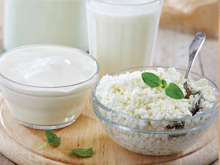Health Topics
-
Healthy Living
-
|
|
April 2012
|
| Don't Knock The Building Blocks |
| Ishi Khosla |
| |
 |
Unlike Western populations, the vast majority of Indians are lacto-vegetarians. They drink milk and eat foods of plant origin and their staple diet does not include eggs and flesh foods. |
Dairy products therefore account for their chief source of first class proteins and milk and milk products like curd, butter, desi ghee, mithais and paneer form their major source of animal fats.
Dairy Guide
- The first class proteins provided by milk and milk products contain all the essential amino acids, which are the building blocks for normal growth and development. Some fatty acids present in milk also contribute to normal growth. In Indian context, therefore, milk and milk products play a vital role in children’s diet.
- Dairy products also provide energy, Vitamins A and D, riboflavin and minerals such as calcium, magnesium, phosphorus and potassium. Milk and milk products help build healthy bones in children.
- Calcium, one of the most abundant nutrients in dairy, not only helps in preventing osteoporosis but is also needed for blood clotting, transmission of nerve impulses, immunity, and maintenance of blood pressure and heart rhythm.
- Milk may also help ease premenstrual symptoms. High calcium intake seems to reduce the risk of colon cancer. More recently, calcium has also been found to be useful in weight loss.
Fat In Dairy: Too Much And Harmful?
Dairy products are versatile and packed with proteins and minerals, but their downfall has always been their high fat content. Conjugated Linoleic acid (CLA), a variant of the essential fatty acid linoleic acid is found in dairy products such as milk, cheese, and butter, and in the meat of cattle and lamb. It is a trans fat, which is not harmful as other trans fatty acids, but rather it is beneficial.
- Studies show that CLA reduces body fat by several mechanisms, including a reduced calorie intake, increased metabolic rate and a shift in the nocturnal fuel.
- CLA is a unique anti-carcinogen, which inhibits the growth of a number of human cancer cells and suppresses chemically induced tumour development.
- Researchers have also discovered that CLA helps in lowering cholesterol and reduces arterial plaque build up.
- It also appears to have antioxidant properties that can prevent heart disease and other chronic diseases.
- Other potential benefits include reduction in food-induced allergic reactions and boost to immunity.
Data is limited and more studies are needed to reveal the significant benefits of CLA supplementation.
Teenagers NEED Milk
The general observation is that youngsters tend to reduce their intake of milk upon entering the teen years. Parents and guardians too seem to believe that milk is not so necessary
once children reach puberty. But some facts remain.
- Calcium, one of the most abundant nutrients in dairy products is found to be useful in weight loss.
- Doing away or avoiding milk or dairy products is not the way to restrict the intake of fat. The better and healthier way is to consume low-fat milk and dairy products.
- When you stick to low-fat dairy products and control your total caloric intake, you may probably lose more weight than you ever did without it.
Aim for at least 2-3 servings of low-fat dairy on a daily basis to achieve a calcium intake of 600-1000 mg / day.
|
For Calcium
Dairy products find a prime place in a healthy diet because the calcium present in them is better absorbed by the human body than calcium present in other sources. Soy is the only exception. People intolerant to dairy products need not despair though. Similar benefits can be harvested by including other calcium rich foods like soya milk and soya products like tofu, green leafy vegetables, seaweeds, sesame seeds, flax seeds, sunflower seeds, poppy seeds, almonds, ragi and amaranth in the diet. |
|
 |
Ishi Khosla is Clinical Nutritionist and Director Whole Foods India New Delhi |
|
|